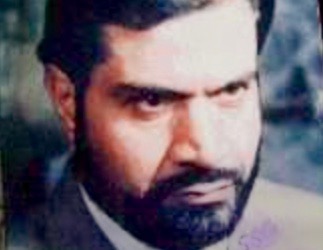A family lost its sole breadwinner to violent death and fell into penury. The murder cost them a decade and a half of struggle, his children’s education and trauma that refuses to abate. Hamidullah Dar reports.

Journalist Sheikh Ghulam Rasool and his family lived happily until March 20, 1996. He was kidnapped near Papa Kishtwari’s house, while returning to his Pampore home from his newspaper office at Press Colony Srinagar. Twenty-two days later his body was fished out from Jhelum near Pampore.
“He was bundled into a big sack, tied to a heavy stone to keep his body underwater. At 41, Ghulam Rasool had been in journalism for 21 years, working as a reporter and then editor of Saffron Times,” says Sheikh’s elder brother Ghulam Muhammad.
The kidnapping sent the Sheikh family into a tizzy and they went to anybody and everybody, who they could, to seek his release. “We went to Papa Kishtwari. However, he pleaded ignorance about it (the kidnapping) and told us that he also will help in searching for my brother. We searched him everywhere but to no avail as he had already been killed,” says Ghulam Muhammad.
Sheikh had made a speech in the local mosque criticising the establishing of bunkers by government gunmen in the populated areas of the town. And this, according to Ghulam Mohammad, had irked Kishtwari. “His (Rasool’s) subordinate Mohammad Shafi of Baginder, driver of the bus in which he was travelling when kidnapped and Ghulam Mohidin Ganai of Chandhara were also killed by Kishtwari to wipe off any traces,” says Ghulam Mohammad.
Though the family filed an FIR but did not follow the case as they feared the Kishtwari’s men who would roam around the town all the time.
“It was the time when Pampore town every day would see a dead body lying on the road or in a street. In that year about 60 people from Pampore and adjacent areas were killed by Kishtwaris men,” said a local Abdul Rashid.
Sheikh’s family had to bear the loss tight-lipped. The slain journalist’s elder son Tanveer was a Class 9 student then. He says, “I could not follow the case as there no witness would come forward. So even though knowing everything I had to keep mum to spare our family any further harm. Even today if a witness (of the murder) comes forward, I will fight the case.”
As the family went through extreme hardships after Shiekh’s murder, Tanveer, a teenage student, had to work to earn for his mother and other siblings. “I started a business along with my maternal grandfather Ghulam Qadir Sheikh,” says Tanveer, who also continued studies and completed graduation. His younger brother, Hussain, could “not bear to see” Tanveer working hard to make ends meet, so he quit studies in class 12 and joined the business. “In that bad patch of time, we tried to earn so that we are not caught in the debt or be dependent on others. Thank Allah we succeeded,” says Tanveer.
In 2001, Tanveer was appointed as a junior assistant against SRO-43 that provides for a low-level government job to kin of person killed in unnatural circumstances.

“I held the job for a year during which I always remained disturbed. The wound of my father’s death was getting more painful with every passing day. And I quit the job one day thinking that it was the government that was responsible for the death of our father and what am I doing holding on to a job provided as compensation,” says Tanveer.
The family had to see real hard days after losing their father to a violent, cruel and unnatural death.
“It was painful to lose our father at such a tender age in such a cruel way but the hard times that followed it (the murder) were more painful,” says Hussain.
Despite facing acute hardships Shiekh’s family declined financial assistance, which many organizations had offered. “Hurriyat and many other organizations offered us assistance but we did not accept even a single penny. Our father was an honest man and had taught us not to stretch begging hand before anybody except Allah,” says Tanveer.
After graduation, Tanveer wanted to pursue a career in the media but his mother forbade him from doing so. “I told my mother of choosing media as a career but she did not allow it,” says Tanveer. The two brothers married off their younger sister Uzma Rasool last year. “We tried our best to provide her everything so that she would not feel that her father could have done it a better way,” adds he.
Living in a four-room one storey house, the family seems to have finally come out of the financial woes if not the trauma of the murder after struggling bravely for more than a decade.















